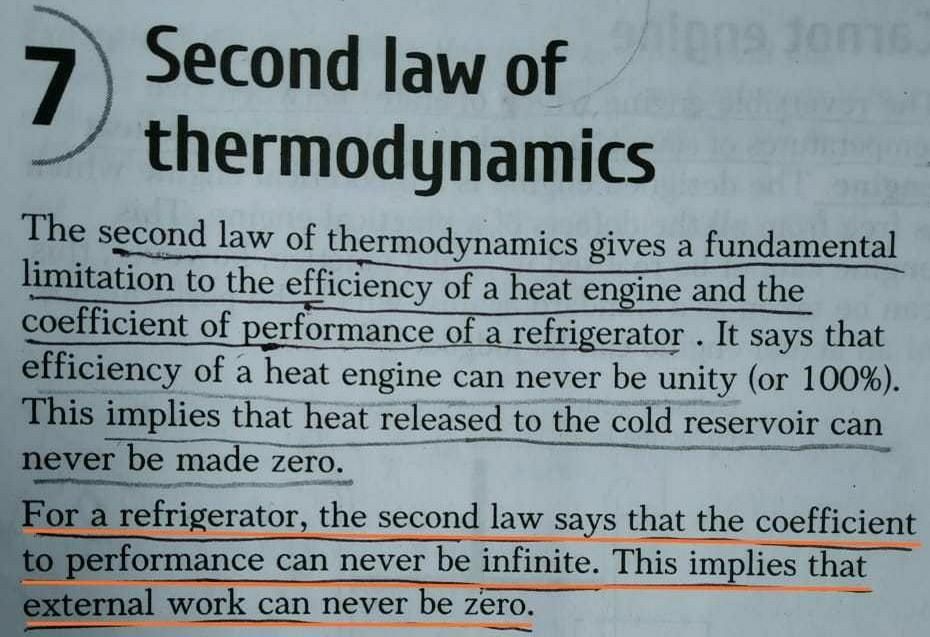Class 11 Exam > Class 11 Questions > The second law of thermodynamics saysa)Coeffi...
Start Learning for Free
The second law of thermodynamics says
- a)Coefficient of performance can never be infinite for refrigerator
- b)Heat released to the cold reservoir can be zero
- c)Ideal gas can expand infinitely
- d)Efficiency of a heat engine can be 100%.
Correct answer is option 'A'. Can you explain this answer?
Most Upvoted Answer
The second law of thermodynamics saysa)Coefficient of performance can ...
The second law of thermodynamics gives a fundamental limitation to the efficiency of a heat engine and the coefficient of performance of a refrigerator. It says that the efficiency of a heat engine can never be unity or 100%, this implies that the heat released to the cold reservoir can never be made zero.
For a refrigerator the second law says that the coefficient through performance can never be infinite, this implies that the external work can never be zero.
For a refrigerator the second law says that the coefficient through performance can never be infinite, this implies that the external work can never be zero.
Free Test
FREE
| Start Free Test |
Community Answer
The second law of thermodynamics saysa)Coefficient of performance can ...


|
Explore Courses for Class 11 exam
|

|
Question Description
The second law of thermodynamics saysa)Coefficient of performance can never be infinite for refrigeratorb)Heat released to the cold reservoir can be zeroc)Ideal gas can expand infinitelyd)Efficiency of a heat engine can be 100%.Correct answer is option 'A'. Can you explain this answer? for Class 11 2025 is part of Class 11 preparation. The Question and answers have been prepared according to the Class 11 exam syllabus. Information about The second law of thermodynamics saysa)Coefficient of performance can never be infinite for refrigeratorb)Heat released to the cold reservoir can be zeroc)Ideal gas can expand infinitelyd)Efficiency of a heat engine can be 100%.Correct answer is option 'A'. Can you explain this answer? covers all topics & solutions for Class 11 2025 Exam. Find important definitions, questions, meanings, examples, exercises and tests below for The second law of thermodynamics saysa)Coefficient of performance can never be infinite for refrigeratorb)Heat released to the cold reservoir can be zeroc)Ideal gas can expand infinitelyd)Efficiency of a heat engine can be 100%.Correct answer is option 'A'. Can you explain this answer?.
The second law of thermodynamics saysa)Coefficient of performance can never be infinite for refrigeratorb)Heat released to the cold reservoir can be zeroc)Ideal gas can expand infinitelyd)Efficiency of a heat engine can be 100%.Correct answer is option 'A'. Can you explain this answer? for Class 11 2025 is part of Class 11 preparation. The Question and answers have been prepared according to the Class 11 exam syllabus. Information about The second law of thermodynamics saysa)Coefficient of performance can never be infinite for refrigeratorb)Heat released to the cold reservoir can be zeroc)Ideal gas can expand infinitelyd)Efficiency of a heat engine can be 100%.Correct answer is option 'A'. Can you explain this answer? covers all topics & solutions for Class 11 2025 Exam. Find important definitions, questions, meanings, examples, exercises and tests below for The second law of thermodynamics saysa)Coefficient of performance can never be infinite for refrigeratorb)Heat released to the cold reservoir can be zeroc)Ideal gas can expand infinitelyd)Efficiency of a heat engine can be 100%.Correct answer is option 'A'. Can you explain this answer?.
Solutions for The second law of thermodynamics saysa)Coefficient of performance can never be infinite for refrigeratorb)Heat released to the cold reservoir can be zeroc)Ideal gas can expand infinitelyd)Efficiency of a heat engine can be 100%.Correct answer is option 'A'. Can you explain this answer? in English & in Hindi are available as part of our courses for Class 11.
Download more important topics, notes, lectures and mock test series for Class 11 Exam by signing up for free.
Here you can find the meaning of The second law of thermodynamics saysa)Coefficient of performance can never be infinite for refrigeratorb)Heat released to the cold reservoir can be zeroc)Ideal gas can expand infinitelyd)Efficiency of a heat engine can be 100%.Correct answer is option 'A'. Can you explain this answer? defined & explained in the simplest way possible. Besides giving the explanation of
The second law of thermodynamics saysa)Coefficient of performance can never be infinite for refrigeratorb)Heat released to the cold reservoir can be zeroc)Ideal gas can expand infinitelyd)Efficiency of a heat engine can be 100%.Correct answer is option 'A'. Can you explain this answer?, a detailed solution for The second law of thermodynamics saysa)Coefficient of performance can never be infinite for refrigeratorb)Heat released to the cold reservoir can be zeroc)Ideal gas can expand infinitelyd)Efficiency of a heat engine can be 100%.Correct answer is option 'A'. Can you explain this answer? has been provided alongside types of The second law of thermodynamics saysa)Coefficient of performance can never be infinite for refrigeratorb)Heat released to the cold reservoir can be zeroc)Ideal gas can expand infinitelyd)Efficiency of a heat engine can be 100%.Correct answer is option 'A'. Can you explain this answer? theory, EduRev gives you an
ample number of questions to practice The second law of thermodynamics saysa)Coefficient of performance can never be infinite for refrigeratorb)Heat released to the cold reservoir can be zeroc)Ideal gas can expand infinitelyd)Efficiency of a heat engine can be 100%.Correct answer is option 'A'. Can you explain this answer? tests, examples and also practice Class 11 tests.

|
Explore Courses for Class 11 exam
|

|
Signup for Free!
Signup to see your scores go up within 7 days! Learn & Practice with 1000+ FREE Notes, Videos & Tests.


















